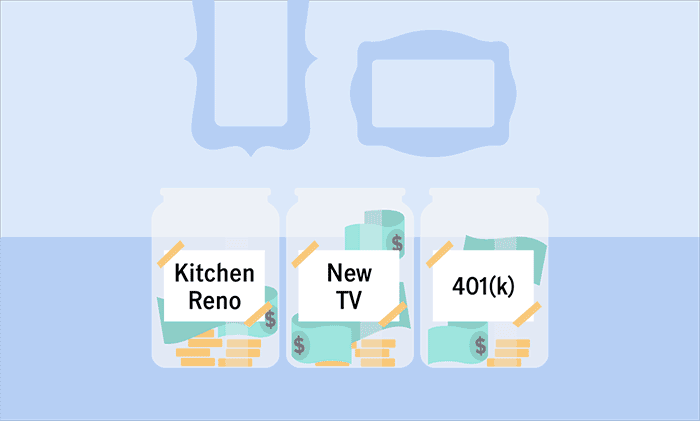How does your 401(k) compare to the national average?
Retire
Many Americans rely on 401(k) plans to help fund their future, but according to our national financial stress survey only 44% feel they were ahead of schedule or on track with their retirement savings.1 One important way to make sure you’re on track to meet your retirement goals is to check your 401(k) account (or other retirement savings) at regular intervals to measure your progress. For most people this means twice a year – unless you’re within a few years of retirement, then you might want to check more often.2
You can also get a sense of how you’re doing by comparing your account balance to the national average. Of course, everyone’s financial situation and long-term goals are different, but understanding how much others are saving can help you set realistic goals for yourself. Here’s how much people of different age groups have saved in their retirement accounts, on average—along with some helpful tactics on how to grow your own savings at each stage.
Age 32 – 37
Average retirement balance: $32,6023
What you can do: automate your contributions

In the early days of your retirement savings journey, one of the most effective things you can do is automate your payments. This simplifies the process and ensures you won’t forget or procrastinate putting money into your account. Since the funds are removed automatically, you’ll be accustomed to it and it won’t feel like you’re missing out on part of every paycheck.4 You can even set up auto-escalation as well, so your contributions automatically increase every year.5
Age 38 – 43
Average retirement balance: $61,9333
What you can do: meet your employer’s match

Eager to see your retirement savings start growing even faster? An employer match is an option you shouldn’t turn down. While you might have other financial goals on the mind at this age – like putting money away for your child's college tuition – if your company will match up to 6% of your contribution, putting in that full 6% yourself is a wise decision. Otherwise you’re simply not taking advantage of the benefits for the company’s employer match.5
Age 44 - 49
Average retirement balance: $113,3703
What you can do: capitalize on an unexpected bonus or raise

We know it’s tempting to earmark a big bonus for a special vacation or home renovation. But putting at least part of any raise or bonus towards your 401(k) can go a long way towards meeting your goals.6 Another great reason to dedicate income bumps to retirement? The average American reaches their peak earning potential between the ages of 44-55.7 Small actions taken now can have big impact down the line.
Age 50 - 55
Average retirement balance: $133,6263
What you can do: make catch-up contributions

Once you hit age 50, the IRS allows you to make 401(k) contributions that are above the standard limit.8 In 2020, the annual contribution limit for a 401(k) is $19,500, but people over 50 can contribute an additional $6,500 – so $25,000 total. These catch-up contributions can be a great way to help boost your savings as your near the final stretch before retiring.
Taking advantage of your 401(k) benefits is the first step towards seeking a comfortable retirement. But managing your 401(k) is not something you should just “set and forget.” Making a habit of regularly assessing your retirement accounts will help make sure you’re on track to meet your financial goals—and have time to make any necessary adjustments and course-correct.
Citations:
1 John Hancock Retirement: “Americans seek advice as pandemic increases financial stress: 2020 Financial Stress Survey”, 2020 https://retirement.johnhancock.com/us/en/financial-stress-survey#retirement-savings
2 FeelingFinancial: “How Often Should I Check my 401(k)?” by FeelingFinancial https://feelingfinancial.com/how-often-should-i-check-my-401k/#:~:text=So%20what's%20the%20deal%20%E2%80%93%20how,sure%20your%20plan%20is%20solid.
3 Economic Policy Institute: “The State of American Retirement Savings” by Monique Morrissey, December 10, 2019 https://www.epi.org/publication/the-state-of-american-retirement-savings/
4 CNBC: “62% of Americans say they’re behind on saving for retirement—here are 4 ways to catch up” by Kathleen Elkins, October 8, 2019 https://www.cnbc.com/2019/10/08/how-to-catch-up-on-your-retirement-savings.html
5 The Motley Fool: “What is a 401(k) and How Do They Work?” by Adam Levy, April 16, 2021 https://www.fool.com/retirement/most-important-401k-rules-maximize-your-savings.aspx
6 CNBC: “These tips will help you max out your retirement contributions this year” by Lorie Konish, June 18, 2019 https://www.cnbc.com/2019/06/18/these-tips-will-help-you-max-your-retirement-contributions-this-year.html
7 CNBC: “This chart shows how much money Americans earn at every age” by Emmie Martin, July 24, 2019 https://www.cnbc.com/2019/07/24/how-much-money-americans-earn-at-every-age.html#:~:text=Full%2Dtime%20workers%20in%20the,a%20recent%20PayScale%20report%20found.
8 Investopedia: “Catch-Up Contribution” by Julia Kagan, January 26, 2021 https://www.investopedia.com/terms/c/catchupcontribution.asp
The content of this document is for general information only and is believed to be accurate and reliable as of the posting date, but may be subject to change. It is not intended to provide investment, tax, plan design, or legal advice (unless otherwise indicated).
John Hancock Retirement Plan Services, LLC• 200 Berkeley Street • Boston, MA 02116
